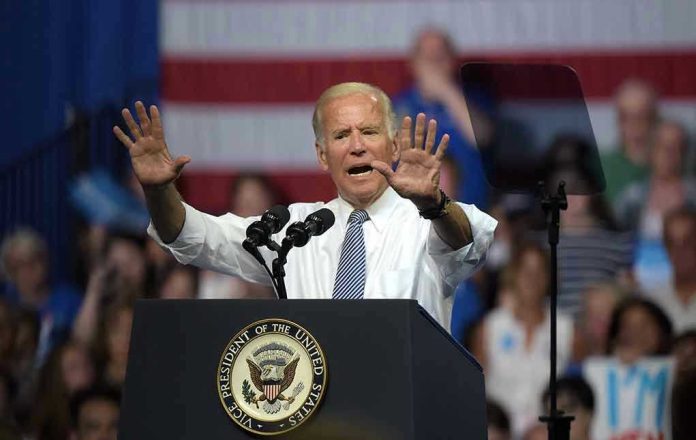
President Trump’s swift revocation of Biden’s far-reaching competition order delivers a decisive blow against expansive federal control, marking a major turning point for those frustrated by years of bureaucratic overreach.
Story Snapshot
- President Trump rescinds Biden’s 2021 competition executive order, dismantling a key pillar of federal regulatory authority.
- The action immediately curtails agency power in sectors like healthcare, finance, and technology, with industry groups largely supporting the move.
- The rollback reflects a return to pro-business, deregulatory priorities that dominated Trump’s first term and sharply contrasts with Biden’s interventionist approach.
- Critics warn of greater market consolidation and weakened consumer protections, while supporters cite relief from excessive “swamp” policies and restored constitutional limits.
Trump Ends Biden’s Expansive Regulatory Agenda with Executive Action
On August 13, 2025, President Donald Trump issued an executive order revoking President Joe Biden’s 2021 Executive Order 14036, which had empowered federal agencies to aggressively intervene in the U.S. economy. This action, executed with minimal fanfare, effectively halts a regime that had allowed unelected bureaucrats to dictate policy across healthcare, finance, technology, and even commercial space. Trump’s move is a direct response to conservative concerns about unchecked federal power and aligns with his longstanding pledge to dismantle what he has called the “regulatory swamp.”
The 2021 Biden order originally aimed to tackle corporate consolidation and boost consumer protections by directing over a dozen agencies to crack down on monopolistic practices. However, critics from the business community and constitutional advocates saw it as a dramatic overreach, arguing it eroded free-market principles and gave Washington unprecedented influence over private enterprise. The Trump administration’s swift repeal is seen by supporters as a restoration of individual liberty, economic dynamism, and a much-needed check on the ever-expanding administrative state.
Sweeping Effects Across Key American Industries
The revocation of Biden’s order has immediate and far-reaching consequences for multiple sectors. In healthcare, some providers have voiced concerns about increased market consolidation, but industry groups and many practitioners welcome the rollback of complex regulations that stifled innovation and raised compliance costs. In finance and technology, the move is expected to spark renewed investment and competition, with fewer bureaucratic hurdles and greater freedom for American companies to grow without constant federal interference. The commercial space industry, a symbol of American ingenuity, benefits from streamlined licensing and reduced federal red tape, accelerating the nation’s leadership in this strategic sector.
Consumer advocacy organizations and some Democratic lawmakers have reacted with alarm, warning that the rollback could enable monopolistic behavior and reduce protections for everyday Americans. Nevertheless, the Trump administration’s message is clear: restore common-sense governance, empower private enterprise, and reassert constitutional boundaries on unelected regulatory agencies.
Contrast in Philosophies: Deregulation versus Bureaucratic Expansion
Trump’s action is emblematic of a broader philosophical divide over the role of government. The Biden administration, following progressive orthodoxy, sought to wield federal power to address market failures, often at the expense of local businesses and traditional American values. By contrast, Trump’s return to office marked an immediate shift back to deregulatory priorities, aiming to reduce the size and scope of government in Americans’ daily lives. Legal experts and policy trackers note that this move, while celebrated in conservative and business circles, may face future court challenges as agencies unwind years of accumulated rules and guidance.
Industry analysts predict an uptick in mergers and acquisitions, particularly in sectors previously targeted by Biden’s order, as companies adjust to the new regulatory landscape. The long-term effects remain uncertain, but the Trump administration’s stance is unmistakable: less Washington control, more room for American innovation, and a renewed commitment to constitutional limits on federal power.
Trump revokes Biden’s swamp-first regulations order https://t.co/Z31d98ODsd
— Washington Examiner (@dcexaminer) August 18, 2025
As agencies work to implement Trump’s directive, regulatory trackers and legal observers are closely monitoring both the pace and scope of the changes. While some consumer advocates lament the shift, the message to the conservative base is clear—Washington’s grip is loosening, and the priorities of Main Street, not the federal bureaucracy, are once again in focus.
Sources:
President Trump Signs Executive Order on Enabling Competition
Trump revokes Biden executive order on competition, impacting healthcare markets
Revocation of Executive Order on Competition
Trump’s 2025 Executive Orders Chart
Tracking regulatory changes in the second Trump administration






